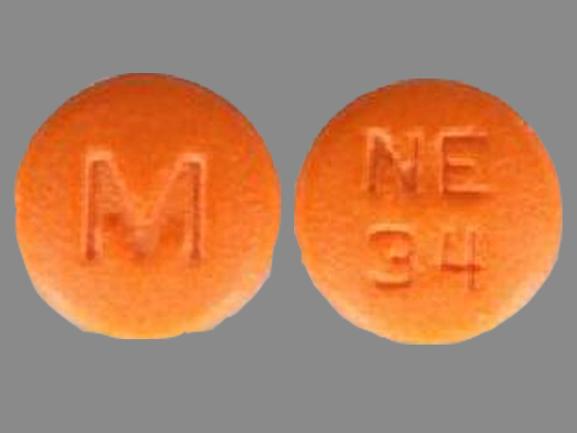Nisoldipine
Generic name: nisoldipine [ nye-ZOL-di-peen ]
Brand name: Sular
Dosage form: oral tablet, extended release (17 mg; 20 mg; 25.5 mg; 30 mg; 34 mg; 40 mg; 8.5 mg)
Drug class: Calcium channel blocking agents
What is nisoldipine?
Nisoldipine is a calcium channel blocker that is used to treat high blood pressure (hypertension) in adults.
Nisoldipine may also be used for purposes not listed in this medication guide.
Nisoldipine side effects
Get emergency medical help if you have signs of an allergic reaction: hives; difficult breathing; swelling of your face, lips, tongue, or throat.
Nisoldipine may cause serious side effects. Call your doctor at once if you have:
-
a light-headed feeling, like you might pass out;
-
chest pain or pressure, pain spreading to your jaw or shoulder;
-
swelling in your hands or feet;
-
flushing (sudden warmth, redness, or tingly feeling);
-
fast heartbeats; or
-
sudden numbness or weakness, problems with vision or speech.
You may have new or worsening chest pain when you first start taking nisoldipine or whenever your dose is changed.
Common side effects of nisoldipine may include:
-
swelling;
-
dizziness; or
-
flushing.
This is not a complete list of side effects and others may occur. Call your doctor for medical advice about side effects. You may report side effects to FDA at 1-800-FDA-1088.
Warnings
Follow all directions on your medicine label and package. Tell each of your healthcare providers about all your medical conditions, allergies, and all medicines you use.
Before taking this medicine
You should not use nisoldipine if you are allergic to nisoldipine or to similar medications such as amlodipine, felodipine, nicardipine, nifedipine, or nimodipine.
Tell your doctor if you have ever had:
-
congestive heart failure;
-
an allergy to yellow food dye; or
-
asthma, or a severe allergic reaction (sneezing, runny or stuffy nose, wheezing, shortness of breath) after taking aspirin.
Older adults may be more sensitive to the effects of this medicine.
It is not known whether this medicine will harm an unborn baby. Tell your doctor if you are pregnant or plan to become pregnant.
You should not breastfeed while using nisoldipine.
How should I take nisoldipine?
Follow all directions on your prescription label and read all medication guides or instruction sheets. Your doctor may occasionally change your dose. Use the medicine exactly as directed.
Take nisoldipine on an empty stomach, at least 1 hour before or 2 hours after a meal.
Swallow the tablet whole and do not crush, chew, or break it.
Your blood pressure will need to be checked often.
Store at room temperature away from moisture, heat, and light.
Keep using all your blood pressure medications as directed, even if you feel well. Read all medication guides you receive. Do not change your dose or stop taking your medicine without your doctor's advice.
Nisoldipine dosing information
Usual Adult Dose for Hypertension:
Slow release (old formulation):
-Initial dose: 20 mg orally once a day
-Maintenance dose: 10 to 60 mg orally once a day
-Maximum dose: 60 mg/day
Controlled release (new formulation):
-Initial dose: 17 mg orally once a day
-Maintenance dose: 8.5 to 34 mg orally once a day
-Maximum dose: 34 mg/day
Comment: This drug has been used with diuretics, ACE inhibitors, and beta blockers.
Use: Alone or in combination with other antihypertensive agents for the treatment of hypertension
Usual Geriatric Dose for Hypertension:
Slow release (old formulation):
-Initial dose: 10 mg orally once a day
-Maintenance dose: 10 to 60 mg orally once a day
-Maximum dose: 60 mg/day
Controlled release (new formulation):
-Initial dose: 8.5 mg orally once a day
-Maintenance dose: 8.5 to 34 mg orally once a day
-Maximum dose: 34 mg/day
Comments:
-Dosing should be performed with caution.
-This drug has been used with diuretics, ACE inhibitors, and beta blockers.
-Blood pressure should be closely monitored during dose adjustments.
Use: Alone or in combination with other antihypertensive agents for the treatment of hypertension
What happens if I miss a dose?
Take the medicine as soon as you can, but skip the missed dose if it is almost time for your next dose. Do not take two doses at one time.
What happens if I overdose?
Seek emergency medical attention or call the Poison Help line at 1-800-222-1222.
What should I avoid while taking nisoldipine?
Grapefruit may interact with nisoldipine and lead to unwanted side effects. Avoid the use of grapefruit products.
What other drugs will affect nisoldipine?
Sometimes it is not safe to use certain medications at the same time. Some drugs can affect your blood levels of other drugs you take, which may increase side effects or make the medications less effective.
Tell your doctor about all your current medicines and any you start or stop using, especially any other blood pressure medicines.
Many drugs can affect nisoldipine. This includes prescription and over-the-counter medicines, vitamins, and herbal products. Not all possible interactions are listed here. Tell your doctor about all your current medicines and any medicine you start or stop using.
More about nisoldipine
- Check interactions
- Compare alternatives
- Pricing & coupons
- Reviews (3)
- Drug images
- Side effects
- Dosage information
- During pregnancy
- Drug class: calcium channel blocking agents
- Breastfeeding
- En español
Patient resources
Other brands
Professional resources
Other brands
Related treatment guides
Further information
Remember, keep this and all other medicines out of the reach of children, never share your medicines with others, and use this medication only for the indication prescribed.
Always consult your healthcare provider to ensure the information displayed on this page applies to your personal circumstances.
Copyright 1996-2024 Cerner Multum, Inc. Version: 8.01.

